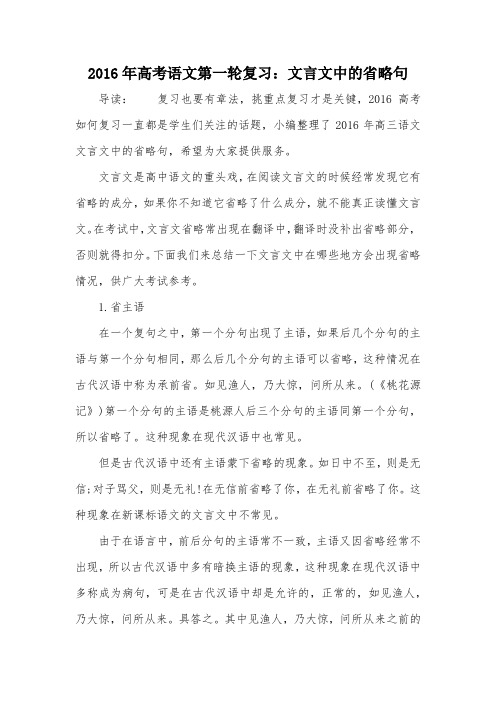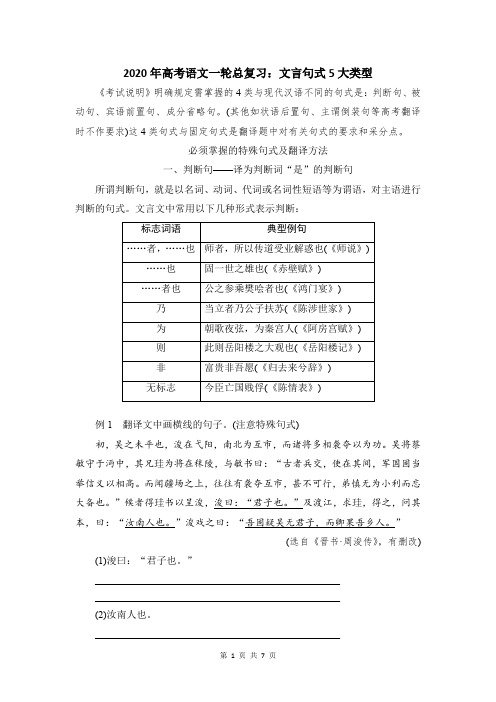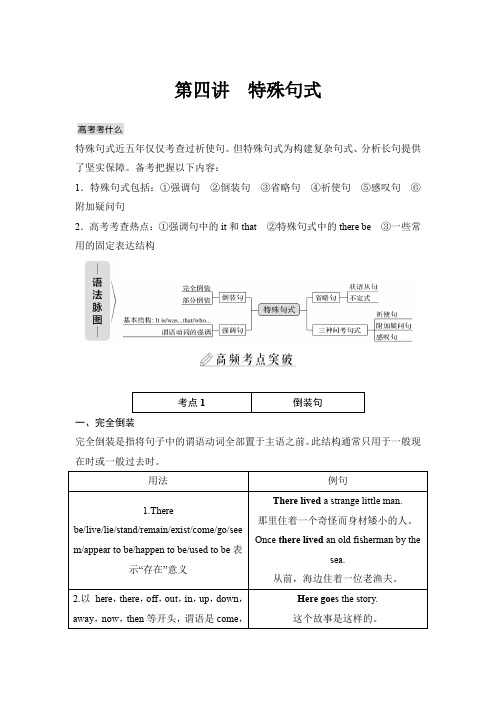高三一轮复习 省略句
- 格式:doc
- 大小:100.50 KB
- 文档页数:6

2016年高考语文第一轮复习:文言文中的省略句导读:复习也要有章法,挑重点复习才是关键,2016高考如何复习一直都是学生们关注的话题,小编整理了2016年高三语文文言文中的省略句,希望为大家提供服务。
文言文是高中语文的重头戏,在阅读文言文的时候经常发现它有省略的成分,如果你不知道它省略了什么成分,就不能真正读懂文言文。
在考试中,文言文省略常出现在翻译中,翻译时没补出省略部分,否则就得扣分。
下面我们来总结一下文言文中在哪些地方会出现省略情况,供广大考试参考。
1.省主语在一个复句之中,第一个分句出现了主语,如果后几个分句的主语与第一个分句相同,那么后几个分句的主语可以省略,这种情况在古代汉语中称为承前省。
如见渔人,乃大惊,问所从来。
(《桃花源记》)第一个分句的主语是桃源人后三个分句的主语同第一个分句,所以省略了。
这种现象在现代汉语中也常见。
但是古代汉语中还有主语蒙下省略的现象。
如日中不至,则是无信;对子骂父,则是无礼!在无信前省略了你,在无礼前省略了你。
这种现象在新课标语文的文言文中不常见。
由于在语言中,前后分句的主语常不一致,主语又因省略经常不出现,所以古代汉语中多有暗换主语的现象,这种现象在现代汉语中多称成为病句,可是在古代汉语中却是允许的,正常的,如见渔人,乃大惊,问所从来。
具答之。
其中见渔人,乃大惊,问所从来之前的主语是桃源人,可是后一句的具答之的主语是渔人。
(《桃花源记》)主语在前后句发生了变化,但都省略了。
2.宾语的省略古代汉语省略宾语的现象,在数量上远远超过了现代汉语。
古代汉语的及物动词虽然也要求一个宾语与之搭配,但这个宾语完全可以不出现而隐含起来,只要宾语所表达的事物在前文中已经出现或者已经谈到过,不再出现也能使人正确体会出动作的接受者,宾语则可以省略。
尉剑挺,广起,夺而杀尉意思是将尉拔出剑站了起来,吴广也站了起来,夺下将尉的剑并且把他杀了。
此句中承前省略了自己的宾语剑。
这些省略在初中文言文中都比较常见。

备考2019年高考英语一轮复习20:省略句一、单选题1.Though of the danger, Mr. Brown still risked his life to save the boy in the fire.A. having toldB. tellingC. to be toldD. told2.Take short walks to calm down, or, _________, simply take a day off.A. if necessaryB. if notC. if everD. if so3.The flowers will die soon unless often ________.A. wateringB. to waterC. waterD. watered4.Every evening after dinner, if not ________from work, I will spend some time walking my dog.A. being tiredB. tiringC. tiredD. to be tired5.The flowers he bought will die unless every day.A. wateredB. wateringC. being wateredD. to water6.___________________, the experiment will be successful.A. If carefully doingB. If it was done carefullyC. If carefully doneD. If doing carefully7.The experiment shows that proper amounts of exercise, if_____ regularly, can improve our health.A. being carried outB. carrying outC. carried outD. to carry out8.They did everything ________.A. as had been originally plannedB. as originally plannedC. as the original planD. as been originally planned9.Parents should be aware of the fact that children, who are raised on a diet of soap operas and online games, seldom, participate in a variety of activities.A. if neverB. if notC. if everD. if so10.—Patrick has won $ 1,000.—_____? He isn't any happier.A. So whatB. So whereC. So whyD. So how11.The experiment shows that proper amounts of exercise, if__________ regularly, can improve our health.A. being carried outB. carrying outC. carried outD. to carry out12.The climate here is quite pleasant, the temperature rarely, , reaching 30C in summer.A. if notB. if everC. if anyD. if so13.We all know that _____ carefully dealt with, the situation will get worse.A. onceB. whenC. ifD. unless14.—I heard you would go to Dalian for your holiday?—I , but I have some important business to deal with.A. would likeB. wantedC. was eagerD. planned to15.When _____ for his views about his teaching job, Philip said he found it very interesting and rewarding.A. askingB. askedC. having askedD. to be asked16.— What should I do with this passage?— _______ the main idea of each paragraph.A. Finding outB. Found outC. To find outD. Find out17.– What's the matter with Della?– Well, her parents wouldn't allow her to go to the party, but she still _________.A. hopes toB. hopes soC. hopes notD. hopes for18.If properly, time is the money in the bank.A. usingB. usedC. to useD. use19.— How about going out for a walk this evening?— ______ good.A. SoundB. SoundedC. SoundingD. Sounds20.Tom seldom, ______, paid for the software on his computer. That is, he used lots of pirated software.A. if anyB. if everC. if someD. if never21.I don't think there will be more than 4 students left in the class,________, because the environment is not fit for studying.A. if soB. if possibleC. if everD. if any22.The director was fully convinced that this moving story, if ______ for television, would be a hit.A. adaptedB. being adaptedC. to be adaptedD. having been adapted23.—What made her mother so angry?—______the exam.A. because she didn't passB. Her not passC. That she didn't passD. Because her no passing24.—Will you keep her company?— .A. Not unless she wants me toB. Unless she wants me toC. Not unless she wants me to keepD. Unless she wants me to keep25.They did everything ________.A. as had been originally plannedB. as originally plannedC. as the original planD. as been originally planned26.—What made Alice so angry?—________ in the rain for an hour.A. She was kept waitingB. Being kept to waitC. Because of waitingD. Being kept waiting27.I've phoned her myself for invitation; ________, she won't come to join my birthday party.A. even soB. now thatC. if soD. as if28.—Why didn't you turn up at the opening ceremony? I was waiting for you all the time.—I . But I had some urgent business to deal with then.A. would like toB. would like to haveC. would like to beD. would like to have attended29.________ for his timely help, I wouldn't have been able to make it through the economic squeeze.A. Were it notB. Would it not beC. Had it not beenD. Should it not be30.—Those senior citizens cheated should have been warned of illegal fund-raising.— . But few could resist the temptation.A. They wereB. They shouldC. They mustD. They did答案解析部分一、单选题1. D解析:状语从句中,如果主从句主语一致,从句中含有be动词的形式,省略从句中的主语和be动词形式。

2020年高考语文一轮总复习:文言句式5大类型《考试说明》明确规定需掌握的4类与现代汉语不同的句式是:判断句、被动句、宾语前置句、成分省略句。
(其他如状语后置句、主谓倒装句等高考翻译时不作要求)这4类句式与固定句式是翻译题中对有关句式的要求和采分点。
必须掌握的特殊句式及翻译方法一、判断句——译为判断词“是”的判断句所谓判断句,就是以名词、动词、代词或名词性短语等为谓语,对主语进行判断的句式。
文言文中常用以下几种形式表示判断:例1翻译文中画横线的句子。
(注意特殊句式)初,吴之未平也,浚在弋阳,南北为互市,而诸将多相袭夺以为功。
吴将蔡敏守于沔中,其兄珪为将在秣陵,与敏书曰:“古者兵交,使在其间,军国固当举信义以相高。
而闻疆场之上,往往有袭夺互市,甚不可行,弟慎无为小利而忘大备也。
”候者得珪书以呈浚,浚曰:“君子也。
”及渡江,求珪,得之,问其本,曰:“汝南人也。
”浚戏之曰:“吾固疑吴无君子,而卿果吾乡人。
”(选自《晋书·周浚传》,有删改)(1)浚曰:“君子也。
”__________________________________________________________________________________________________(2)汝南人也。
__________________________________________________________________________________________________(3)吾固疑吴无君子,而卿果吾乡人。
__________________________________________________________________________________________________[答案](1)周浚阅后说:“真是个君子啊。
”(“君子也”,判断句式)(2)我是汝南人。
(判断句式)(3)我原本怀疑吴地没有君子,而您果然是我的同乡。



第四讲 特殊句式特殊句式近五年仅仅考查过祈使句。
但特殊句式为构建复杂句式、分析长句提供了坚实保障。
备考把握以下内容:1.特殊句式包括:①强调句 ②倒装句 ③省略句 ④祈使句 ⑤感叹句 ⑥附加疑问句2.高考考查热点:①强调句中的it 和that ②特殊句式中的there be ③一些常用的固定表达结构一、完全倒装完全倒装是指将句子中的谓语动词全部置于主语之前。
此结构通常只用于一般现在时或一般过去时。
二、部分倒装部分倒装是指将谓语的一部分,如助动词或情态动词,置于主语之前。
如果句中的谓语部分不含有助动词或情态动词时,则需添加助动词do, does或did,并将其置于主语之前。
将下列句子变为倒装句①She didn’t have supper until her mother returned.→Not until her mother returned did__she__have__supper.②I hardly think it possible to finish the job before dark.→Hardly do__I__think__it__possible__to__finish__the__job__before__dark.③He learned the sad news only after the war.→Only after the war did__he__learn__the__sad__news.④He speaks English so clearly that he can always make himself understood.→So clearly does__he__speak__English__that__he__can__always__make__himself__understood.强调句型的基本结构单句语法填空/补全句子①It was when I got back to my apartment that I first came across my new neighbors.(天津卷单选改编)②It was only when the car pulled up in front of our house that__we saw Lily in thepassenger seat.(2018·天津卷单选改编)③It__was__not__until__midnight__that the noise of the street stopped.直到午夜,街上的嘈杂声才停止。
高考英语一轮复习重点句型归纳+对点训练1.while/when状语从句的省略。
例句:While walking the dog, you were careless and it got loose and was hit by a car.在遛狗的时候,你不小心松了手,结果它被一辆汽车撞了。
即学即练1:出去散步的时候,你应该随身带一个小垃圾袋。
While_going_for_a_walk,_you should take along a small garbage bag.即学即练2:Water turns into vapour when it is heated.→改成省略句:Water turns into vapour when heated.即学即练3:(单句语法填空)When_____asked_______(ask)why he was late, he kept silent.I fell asleep while___watching______________(watch)TV.2. be doing/ be about to do/be on the point of doing / had done…, when…(when:这时, 强调一个动作的突然发生)1). I was walking along the river, when I heard a drowning boy cry for help.2). I was about to leave when it began to rain.3). I had just finished my test paper when the bell rang, announcing the exam was over.即学即练1.:我刚刚坐下来工作就听到有人在敲门。
I had_just_sat_down_to_work_when I heard someone knocking at the door.即学即练2. 我们正在看电视,这时候妈妈进来了。
省略句(Ellipsis)概念:一个句子中有时一个或更多的成分会被省略掉,这样的句子称为省略句。
1) 简单句中的省略:(情景会话)①省略句子的主语,在交际用语中出现的很多。
(I) Beg your pardon. / (I) Haven’t seen you for ages! / (It) Doesn’t matter.②省略主谓语或主谓语的一部分(You come) This way, please. / (This is) Jane speaking. / (Are you) Feeling any better today?(Would you like) Some more tea? / (Is there) Anything I can do for you?/ (It’s a) Pity you couldn’t come. / Why not buy her some flowers? / (You’d) Better do sth.③省略宾语—Which of them is the better choice? —Well, it’s hard to tell (it).1. (2007四川, 14) —Dad! Tom's broken a glass! — ________. Accidents will happen.A. No wayB. Doesn't matterC. No trouble at allD. Don't mention it2.(2006湖北, 29)—I was wondering if we could go skiing on the weekend.―good. A. Sound B. Sounded C. Sounding D. Sounds3.(2006重庆, 35)—How about seeing the new movie at the theatre tonight?—_______, but I’ve got to go over my notes for tomorrow's exam.A. All rightB. Sounds greatC. I can’tD. No, I am terribly sorry4. (2004辽宁) —Guess what ! I came across an old friend at the party last night.—______. I’m sure you had a wonderful time.A. Sounds good!B. V ery wellC. How nice !D. All right !5.(2008安徽, 25)—I have some big news for you. You’ve been accepted as a member of our club.—_______ That’s great!A. Have I?B. Pardon?C. Congratulations!D. Good idea!6. (2011安徽, 35) —We got here Tuesday afternoon.—_______ Why didn’t you call us earlier?A. Good luck!B. You did?C. It’s no surprise.D. You are welcome7.(2004广东)If you are planning to spend your money having fun this week, better ______it—you’ve got some big bills coming.A. forgetB. forgotC. forgettingD. to forget8. Better _____ all the lights are turned off before you leave the classroom.A. to be sureB. to make sureC. be sureD. make sure9. (NMET2003) —Susan, go and join your sister cleaning the yard.—Why ______? John is sitting there doing nothing.A. himB. heC. ID. me10. (1997上海) —What do you think made Mary so upset? —______ her new bicycle.A. As she lostB. LostC. LosingD. Because of losing2) 并列句中的省略:(and, or but, yet, so , for)在并列句中,如果后面分句中有前面相同的部分,就常给省略掉:Turandot says any potential husband must answer three riddles correctly or (he must) die.(Book III L57) Some books are to be tasted, others (are) to be swallowed, and some few(are) to be chewed and digested.一些书可以浅尝辄止;一些书可以狼吞虎咽;而有些书则需要细嚼慢咽,好好消化。
We tried to help, but (we tried) in vain. 我们想法子帮助她,但没用。
11.(2007北京)He has made a lot of films, but ______ good ones.A. anyB. someC. fewD. many12. (MET90) The piano in the other shop will be _____, but ______.A. cheaper; not as betterB. more cheap; not as betterC. cheaper; not as goodD. more cheap; not as well13. One of the sides of the board should be painted yellow, and ______.A. the other is whiteB. another whiteC. the other whiteD. another is white14. When he got home,he found that the house_____ and some jewelry _____.A. has broken into; has been stolenB. had been broken into; stoleC. had been broken into; stolenD. has been broken into; stolen15. In some western countries, the rich are becoming richer, and _______.A. the poor the poorB. poor poorC. the poor poorerD. poorer the poor16. The thief tried to open the locked door but _____.A. in no wayB. in vainC. without effectD. at a loss3) 复合句中的省略:(1) 宾语从句:①that引导宾语从句时可省略,但如果有两个或两个以上的宾语从句时,只有第一个that可以省略。
The teacher said (that) Tom was a clever boy and that he liked him.②wh-疑问词引导宾语从句且后面的内容与前面重复时,可以把重复的内容省去,而保留wh-疑问词Tom was sad, but I don’t know why (he was sad).17. (2007湖南, 8) Having checked the doors were closed, and _____ all the lights were off, the boyopened the door to his bedroom. A. why B. that C. when D. where18. Dr Black comes from either Oxford or Cambridge. I can’t remember _______.A. whereB. thereC. whichD. that(2) 定语从句:关系代词作宾语时常省略a. 在限定性定语从句中,关系代词that, which, whom作宾语且不位于介词之后常省略。
This is the room (which/ that) LuXun once lived in.19.(05北京)—Why does she always ask you for help?—There is no one else ______, is there?A. who to turn toB. she can turn toC. for whom to turnD. for her to turn20. (1992全国,27) In the dark street, there wasn’t a single person ______ she couldturn for help. A. that B. who C. from whom D. to whom21.(2006江西, 33)—Do you have anything to say for yourselves?—Yes, there’s one point_______ we must insist on.A. whyB. whereC. howD. /22. (NMET 2002上海春) Is this the reason ________ at the meeting for his carelessness in his work?A. he explainedB. what he explainedC. how he explainedD. why he explainedb. way 和time 后接定语从句的情况the way 后的定语从句①(1996上海)I don’t like the way (in which/ that) you speak to her.②This is the way that / which really works.③This is the way (that/ which) he uses to solve the problem.▲先行词是time时,表“次数”用关系代词that引导定语从句(可省略);表“一段时间”用关系副词when 或介词at/ during which23.(92)—Do you know our town at all? —No, this is the first time I _______ here.A. wasB. have beenC. cameD. am coming24.(04’湖北卷)There was ________time ________I hated to go to school.A. a; thatB. a; whenC. the; thatD. the; when25. (2004湖北, 29) What surprised me most was not what he said but ______ he said it.A. the wayB. in the way thatC. in the wayD. the way which(3) 状语从句中的省略:条件:①从句中谓语动词为to be的任何一种形式②从句中主语与主句主语一致或从句中主语谓语为it is 时。